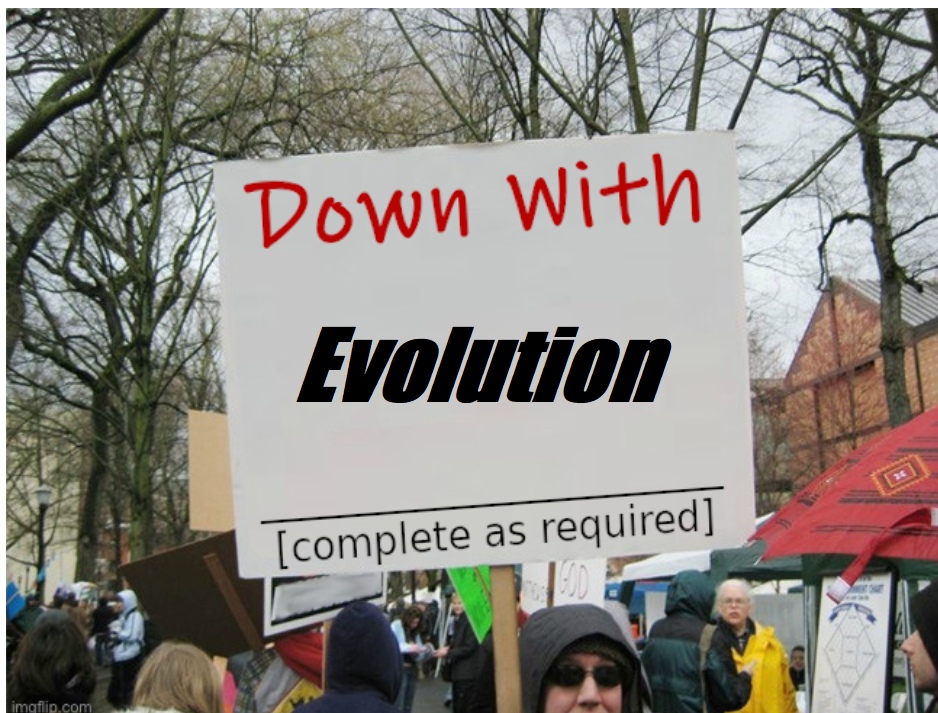Down With... Evolution
In December of 1903, the Wright Brothers made their famous powered flight on the beach at Kitty Hawk, North Carolina.
It wasn't much of a flight, by modern standards. The whole thing lasted about twelve seconds, and the vehicle travelled a total of 120 feet (less than the wingspan of a modern jet). And Orville's luggage never did turn up.
Still, first is first, and however humble their experiment might be, it has earned its place in history (and in textbooks around the world) as the birth of powered aviation.
Except it isn't quite as simple as that.
Several other pioneers were experimenting with similar technology around the same time, and there has been some controversy over the years about which one of them actually succeeded first.
In 2013, the American State of Connecticut passed a law declaring that Gustave Whitehead was really the first person to achieve powered flight, in 1901 (in Connecticut, unsurprisingly).
In retaliation, the State of Ohio (where the Wright Brothers had built their machine) passed a Resolution repudiating any other claim to the first powered flight.
It's officially the Wright Brothers. Thus spake Ohio.
I mention all of this, not for its own sake (although it is supremely weird) but because the question of who made the first successful flight (and when) is not really a matter of opinion. These are historical events: they either happened, or they didn't happen. Passing a law is not going to have any impact on what is true.
It's amazing how many people apparently disagree with that.
In 1925, an American schoolteacher named John Stokes was arrested in the town of Dayton, Tennessee, charged with violating the "Butler Act".
The Butler Act was a Tennessee law that made it a criminal offense to teach anything that contradicted the story of Creation as laid out in the Book of Genesis:
...it shall be unlawful for any teacher in any of the Universities, Normals and all other public schools of the State which are supported in whole or in part by the public school funds of the State, to teach any theory that denies the Story of the Divine Creation of man as taught in the Bible, and to teach instead that man has descended from a lower order of animals.
The subsequent trial (a high profile media circus that came to be known as The Tennessee Monkey Trial) is the subject of our next film.
Inherit the Wind was originally a stage play (first performed in 1955) by Jerome Laurence and Robert E. Lee (no relation). In essence, it is a fictionalised re-telling of the 1925 "Monkey Trial" although all the names have been changed.
Before we go any further with this, let's get one thing out of the way:
Evolution is an observable phenomenon, like gravity. If someone chooses to disbelieve in gravity, that is their absolute right. But if they then step off a building, gravity isn't going to care what they believe.
Evolution is the reason why antibiotics are becoming less effective, and why insects are developing resistance to pesticides. It's also the reason why there are so many variants of COVID.
This is not like Peter Pan's "Clap if you believe in fairies" where something is only true if enough people think that it's true.
Making Evolution illegal does not make it false, any more than passing a law about the Wright Brothers' flight had any impact on what might (or might not) have actually happened.
But anyway, enough about that.
Inherit the Wind dramatizes the court battle between the Creationist William Jennings Bryan and the famed liberal attorney Clarence Darrow (here referred to as Matthew Harrison Brady and Henry Drummond, respectively).
Religious advocates in the US have been quick to point out that the real William Jennings Bryan was not as fundamentalist as he is portrayed here, but the playwrights were deliberately using the Monkey Trial as a metaphor (again!) for the McCarthy anti-Communist era. Thus, the story becomes a parable for the dangers of making ideas illegal.
Fredric March and Spencer Tracy, both passionate liberals, give the performances of their lives. Gene Kelly (in a slightly atypical role) plays the acerbic journalist E K Hornbeck who covers the trial for his Baltimore newspaper (nothing whatsoever to do with H L Menken; I don't know what made you say that). Kelly's wife, Betsy Blair, was blacklisted and had been forced to flee to Europe, ending their marriage of sixteen years.
It's worth noting that Evolution was actually less controversial in 1925 than it is now (at least in the US). Tennessee's "Butler Act" was widely ridiculed at the time, and dismissed as an embarrassing relic of an outmoded world-view (hence the contemptuous and dismissive term "Monkey Trial").
In any event, the 1960 film adaptation of Inherit the Wind stands as a passionate and powerful celebration of the freedom of expression, and a cautionary tale of the dangers of criminalising ideas.
We will screen Inherit the Wind at 7.30 on the 16th of February at the Victoria Park Baptist Church!
















Comments
Post a Comment